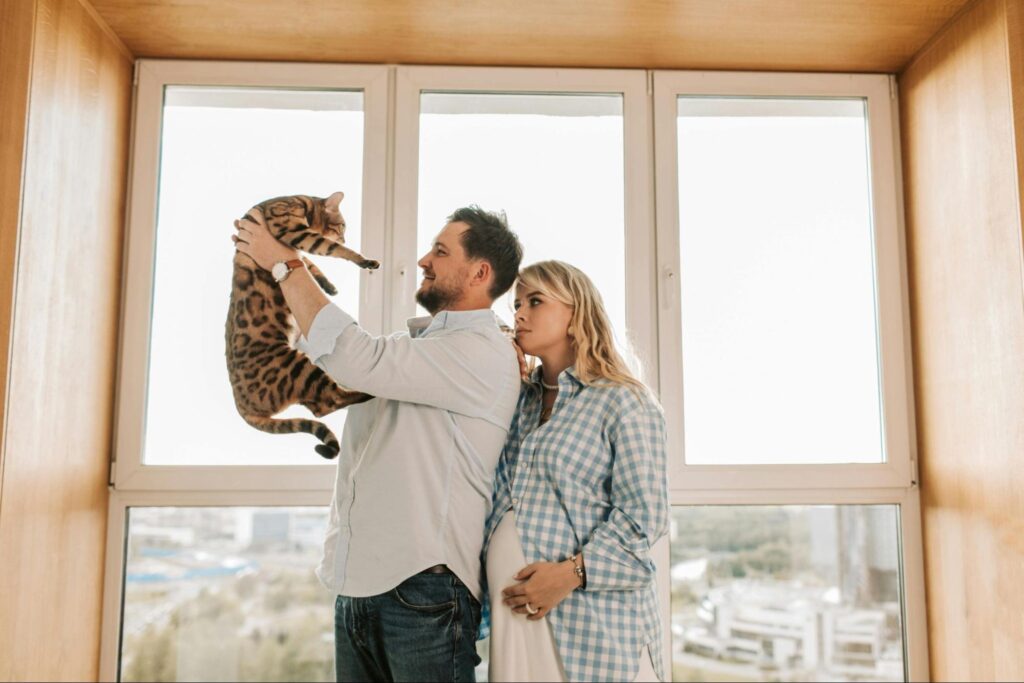Adopting a pet can be one of the great joys of life. Many couples now decide to become parents to an adorable dog, cat, or even a turtle to “test the waters” before having a baby.
Forbes recently reported that young pet parents learn responsibility on the job, including disciplining their furry friends and caring for their health. Almost 74% of younger pet owners take out pet insurance and manage their spending well in case of a health emergency.
Be that as it may, let’s admit that parenting a human baby can be a different ball game altogether. In fact, as a pet mom or dad, you will need to take a few precautions to ensure the household runs smoothly after the baby arrives.
Here are some reminders to assist you during this exciting but unnerving time. They will keep your little ones – humans and four-legged – healthy and happy.
Boundaries Don’t Stop Bonding
Some pets immediately fall in love with their baby brother or sister. Country Living magazine notes that a Beagle or a Golden Retriever is excellent with small children. These dogs have a playful but gentle demeanor, which makes it likely that the bond will be instant.
Usually, cats are also comfortable with having babies around. Some cats sense a baby’s arrival during pregnancy. Their powerful sense of smell helps them identify signs of surging hormones like estrogen and progesterone.
However, you may struggle with dog breeds like a Siberian Husky or a Chow Chow. They can be hard to train and may be triggered by loud crying. Keep distance between such pets and babies to avoid an untoward incident. Consider installing guard rails and not keeping your infant unsupervised in the presence of the family pet.

You may need to cordon off some areas after the baby arrives, like the kitchen island with feeding equipment. Some dogs are naturally curious, and all the new activities at home may get them twice as excited. Last year, USA Today reported an unfortunate accident in Colorado Springs, where a dog accidentally turned on the stove and caused a fire. It sets the heart racing in anxiety.
There is little need to be disheartened since even stubborn dogs will likely love playing with older children. Huskies, for example, are very active and love energetic games. Pet parents must remember that setting early boundaries does not disallow bonding.
Pet Potty Training 2.0
Your baby has a couple of years before they start potty training. Elimination communication, or EC, begins toilet training as early as four months, but it is still not as widespread. Still, someone else needs to ramp up their game: your pet!
Coming in contact with a pet’s potty can become a health concern for babies. The CDC warns that inadequate care can expose children to hookworms, ringworms, and parasites. During pregnancy, cat litter boxes can raise one’s risk of toxoplasmosis. This dangerous parasitic infection can cause adverse symptoms in those with reduced immunity.
While preparing for your baby’s arrival, it is crucial to reinforce potty training for pets. They must use their litter box or go on scheduled walks to do their business.
Why not use this time to pamper your pets a little extra by taking them on extra-nice walks? For example, Colorado Springs has the gorgeous Bear Creek Dog Park, which requires no leash. It even has a separate washing area to spring-clean your dogs before leaving.
At home, you must deal promptly with any “accidents.” Also, your pet must realize that their human is displeased. A professional cleaning service is a worthy investment at this time to ensure your home and yard are free of unattended poop and germs. You can search for a poop scoop service near me to book a regular pick-up.
Since anxiety often becomes second nature for parents of newborns, only scooping up poop may still leave you dissatisfied. What if the mess left behind invisible but harmful microbes? Scoop Soldiers recommends sanitization and deodorization to eliminate germs and leave only a pleasant fragrance. Moreover, it will lend you mental peace that your turf is safe for the baby.
Hair and Hygiene Need Work
On hygiene, pet parents may need to implement a more thorough hair management system. Some dogs are massive shedders. Akitas actually “blow their coats,” which means they shed their thick winter coats in clumps over a few weeks.

Medical News Today reports that pet shedding may trigger eczema in babies. It may happen because of a weak skin barrier. Coming in contact with pet hair or saliva may fuel inflammation and itchiness. The connection remains unclear, with some people feeling that exposure to pet fur early in life may reduce the risk of eczema.
Whatever the scenario, there is no harm in keeping pets cleaner at this time through regular baths and brushing. You can also keep some areas, like the baby cot, completely hypoallergenic by not allowing pets to sit there.
Further, ensure that your pets stay updated with all their vaccines and wellness checks. Cats and ferrets also need vaccinations for rabies and other routine testing by the veterinarian. WebMD has a helpful vaccination schedule for pets you can refer to for appointments.
So, are you all set to welcome your precious human home? Your four-legged baby probably also senses the excitement and anticipates the arrival of a new family member.
It is a glorious time for spending memorable moments together through activities like pet photoshoots and more treats. You are unlikely to find energy or time for anything other than baby care in the next few months!

